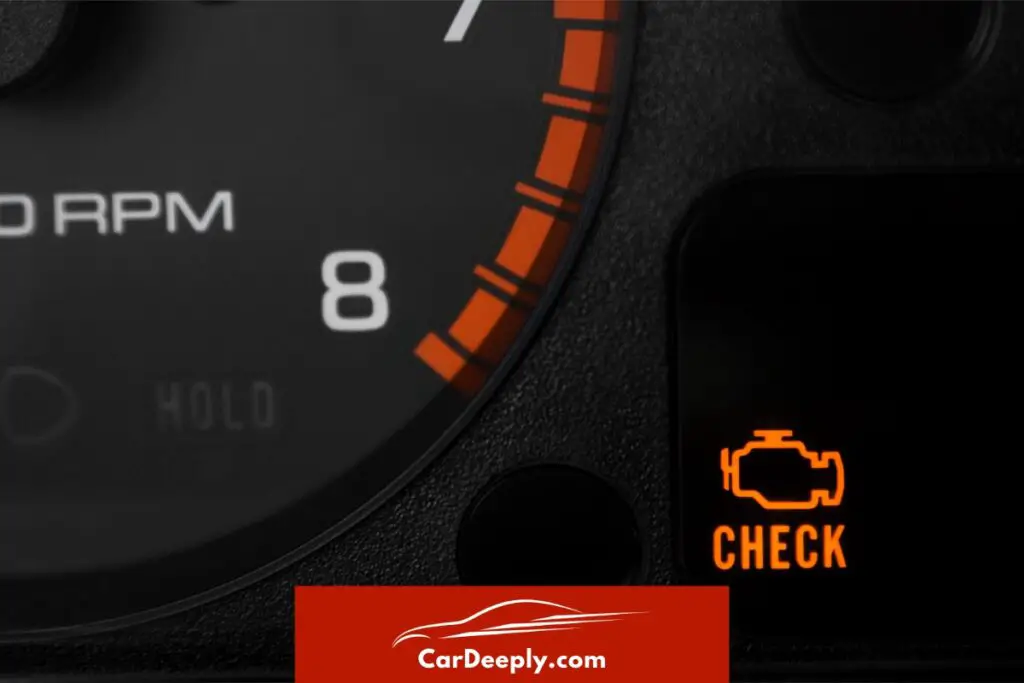Ever had your car shake and the check engine light flash simultaneously?
It’s a heart-stopping moment. But don’t panic just yet! This guide is your lifesaver, helping you dodge costly mistakes and unnecessary stress.
We’ll dive into the following:
- Unraveling the mystery behind the issue
- Common causes and their fixes
- Essential tips for safe driving
Get ready to become your car’s best friend!
Advertising links are marked with *. We receive a small commission on sales, nothing changes for you.
Key Takeaways

- Flashing check engine lights and car shaking often indicate a misfire.
- Common causes include faulty spark plugs and fuel delivery issues.
- Ignition coil damage and compression loss can also trigger these symptoms.
- Driving with these issues can lead to further car damage.
- Regular maintenance and prompt attention to issues are crucial.
Understanding the Issue: Check Engine Light Flashing and Car Shaking
Have you ever been cruising down the road, only to have your peace shattered by a flashing check engine light and a shaking car? It’s enough to make anyone’s heart race.
But don’t worry; we’ve got you covered.
First things first, let’s get to grips with the problem. When your car starts shaking and the check engine light flashes, it’s usually a sign of a misfire in one or more of the engine’s cylinders.
This can be due to various issues, from faulty spark plugs to fuel delivery problems.
But why does this matter? If left unchecked, these issues can lead to more serious problems, such as damage to your car’s catalytic converter or even engine failure. So, it’s crucial to address the issue as soon as possible.
Check Engine Light: Flashing vs. Steady
What’s the difference between a steady and a flashing check engine light? Good question!
A steady check engine light typically indicates a diagnostic fault code has been logged and stored, whether currently active or not. It’s like your car’s saying, “Hey, something’s not quite right here.”
On the other hand, a flashing check engine light is more urgent. It’s your car’s way of shouting, “Hey, there’s a serious problem here!” It usually indicates a misfire on one or more specific cylinders.
Common Causes of Car Shaking and Check Engine Light Flashing
What could be causing your car to shake and the check engine light to flash? Here are some of the most common culprits:
- Faulty Spark Plugs: These little guys are responsible for igniting the fuel in your engine. If they need to be fixed, it can lead to a misfire.
- Damaged Ignition Coil: The ignition coil is like a mini transformer, providing the spark plug with the high voltage it needs to ignite the fuel. If it’s damaged, it can’t do its job properly.
- Fuel Delivery Issues: If there’s a problem with the fuel getting to the engine, it can cause a misfire. This could be due to a faulty fuel injector or a clogged fuel filter.
- Compression Loss: This is more common in older or high-mileage engines. If there’s a loss of compression in one or more cylinders, it can lead to a misfire.
- Emissions Control Induced Misfires: If there’s a problem with the emissions control system, it can lead to a misfire. This is often due to an EGR valve that’s stuck open.
Remember, this is just a quick overview. In the next part, we’ll dive deeper into these causes and how to fix them.
So, stay tuned!
Detailed Analysis of Each Cause
Let’s roll up our sleeves and dive into the nitty-gritty of each cause. Understanding these can help you diagnose and fix the problem, saving you time, stress, and money!
Faulty Spark Plugs
Your car’s engine relies on spark plugs to ignite the fuel-air mixture in the cylinders. When they’re working properly, you’re cruising along without a care. But when they’re not, you could find yourself with a shaking car and a flashing check engine light.
Spark plugs can become fouled, meaning they’re dirty or covered in grime, which can prevent them from sparking properly. They can also wear out over time, leading to an incorrect gap and making ignition difficult.
The good news? Spark plugs are relatively easy and inexpensive to replace. So, if you’re experiencing problems, this is one of the first things you should check.
Damaged Ignition Coil
The ignition coil is a key component of your car’s ignition system. It transforms the battery’s low voltage to the thousands of volts needed to create an electric spark in the spark plugs, igniting the fuel.
If the ignition coil is damaged, it won’t be able to produce this high voltage. This can lead to a misfire, causing your car to shake and your check engine light to flash.
Fuel Delivery Issues
Your car’s engine needs a steady supply of fuel to run properly. If there’s a problem with the fuel delivery, it can lead to a misfire.
This could be due to a faulty fuel injector, which delivers fuel to the engine, or a clogged fuel filter, which filters out dirt and other particles from the fuel.
If the fuel injector is faulty or the fuel filter is clogged, it can prevent the correct amount of fuel from reaching the engine.
Compression Loss
Compression loss is a more serious issue that can lead to a misfire. It’s more common in older or high-mileage engines and can be caused by various topics, including damaged pistons, compromised piston rings, or valve-related issues.
If you’re experiencing compression loss, it’s best to take your car to a professional. They can perform a compression test to diagnose the problem and recommend the best action.
Emissions Control Induced Misfires
Finally, problems with the emissions control system can also lead to a misfire. This is often due to an open EGR valve, allowing excess exhaust gases to be recirculated into the engine’s intake.
This can disrupt the balance of fuel and air in the engine, leading to inefficient combustion and a misfire. If you’re experiencing this issue, it’s important to get it fixed as soon as possible to prevent further damage to your engine.
Is It Safe to Continue Driving?
So, you’ve got a flashing check engine light and a shaking car. Is it safe to keep driving? In a word, no.
Driving with a misfire can cause further damage to your car, including damage to the catalytic converter and other engine components. It’s best to get to a safe place and call for help.
Practical Tips and Solutions
Now that we’ve covered the common causes of a shaking car and flashing check engine lights let’s talk about what you can do to fix the problem.
- Regular Maintenance: Regularly checking and replacing your spark plugs and ignition coils can prevent many problems before they start.
- Check Fuel System: If you’re experiencing problems, check your fuel injectors and fuel filter. They may need to be cleaned or replaced.
- Professional Help: If you’re dealing with compression loss or emissions control issues, it’s best to seek professional help. These issues can be complex and require specialized knowledge and tools to fix.
Remember, regular maintenance and prompt attention to any issues are the keys to keeping your car running smoothly. Don’t ignore that flashing check engine light – your vehicle is trying to tell you something!
Frequently Asked Questions
How often should I replace my spark plugs to prevent my car from shaking and the check engine light from flashing?
Typically, spark plugs should be replaced every 30,000 to 90,000 miles. However, this can vary depending on the spark plug type and your vehicle’s specifications. Regularly checking your spark plugs can help prevent issues like a misfire, which can cause your car to shake and your check engine light to flash.
Can a bad battery cause my check engine light to flash and my car to shake?
While a bad battery itself won’t cause your check engine light to flash or your car to shake, it can lead to other issues that might. For example, if your battery isn’t providing enough power, it could affect the ignition system, leading to a misfire.
What should I do if my fuel injectors are faulty?
If your fuel injectors are faulty, they may need to be cleaned or replaced. This is a job that a professional mechanic can do. Ignoring this issue can lead to a misfire, causing your car to shake and your check engine light to flash.
How can I prevent compression loss in my engine?
Regular maintenance is key to preventing compression loss. This includes frequent oil changes and keeping your engine in good condition. If you suspect you’re experiencing compression loss, it’s best to seek professional help.
Can regular maintenance prevent my check engine light from flashing and my car from shaking?
Absolutely! Regular maintenance, including checking and replacing spark plugs, checking the fuel system, and keeping your engine in good condition, can help prevent many issues that can cause your check engine light to flash and your car from shaking.
Conclusion
Phew, that was a lot to take in, wasn’t it?
But now you’re armed with the knowledge you need to understand why your car might be shaking and your check engine light flashing.
You’ve learned about the common causes, the risks of continuing to drive, and some practical tips and solutions.
Remember, the most important thing is to take action.
Pay attention to the problem – address it head-on. Your car, and your wallet, will thank you!

Sebastian loves convertibles and drove a BMW 335i for a long time (325 hp is just a dream). Today, with two children, he is more concerned with SUVs and family-friendly vehicles. In addition to an Audi A4 Avant, he also drives a Cupra Formentor VZ – even as a family man, you can’t do without speed. Get to know Sebastian better and visit the About Us page.
Advertising links are marked with *. We receive a small commission on sales, nothing changes for you.

